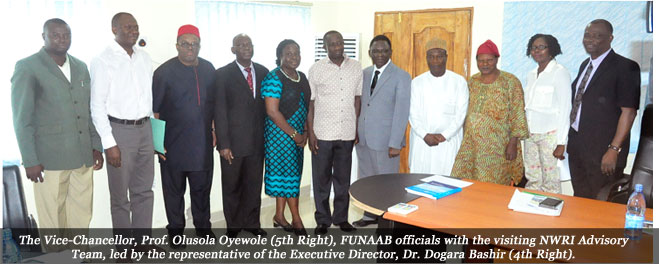 The Executive Director, National Water Resources Institute, Kaduna (NWRI), Dr. Emmanuel Adanu, has stated that water is everybody’s business, adding that everyone is a stakeholder in the task of managing water resources. Dr. Adanu disclosed this during the visit of the Advisory Team to Capacity Building Institution (CBI), which is domiciled in FUNAAB and also host for the Southwest geopolitical zone.
The Executive Director, National Water Resources Institute, Kaduna (NWRI), Dr. Emmanuel Adanu, has stated that water is everybody’s business, adding that everyone is a stakeholder in the task of managing water resources. Dr. Adanu disclosed this during the visit of the Advisory Team to Capacity Building Institution (CBI), which is domiciled in FUNAAB and also host for the Southwest geopolitical zone.
According to the Dr. Adanu, “All capacity building Universities were contacted around the country and they responded, while the National Advisory Council of NWRI assessed the Universities which has a mandate of picking one University from each geopolitical zone and based on its submission, we chose the best from each zone and for the Southwest, this University (FUNAAB), happens to be the best and that is why FUNAAB is part of the network”.
Represented by the Director, Research and Technical Services of the Institute, Dr. Dogara Bashir, he noted that, “When we were assessing the Universities, we made sure that the University has all the complements of the various sectors”. In his Discussion Points to the six National Water Resources Capacity Building Network (NWRCBNet) institutions, the Executive Director said that Water Sector Capacity Development Networks had advanced over the past few decades globally, saying that the functioning of these networks had helped to bridge the human capacity and skill gaps in the sector, serving as platforms for sharing multi-disciplinary information, experience, skills, materials, tools and knowledge in building capacity.
He traced the origin of water sector capacity building in Nigeria to the National Water and Sanitation Training Network (NWSTN) in 1993 which was an initiative of NWRI in collaboration with the National Urban Water Sector Reform Project (NUWSRP. He added that the success of the network led to the establishment of the NWRCBNet in 2006 by the National Council on Water Resources.
Describing one of the objectives of the Network, he said it was basically meant to strengthen institutions and human capacities through partnerships for the successful implementation of Integrated Water Resources Management in Nigeria. According to him, the expected impact of the Network in Nigeria was the sustained availability of
appropriate manpower, skilled and knowledgeable in Integrated Water Resources Management throughout the country.
Responding, the Vice-Chancellor, Professor Olusola Oyewole, commended the visiting team, headed by the Dean, College of Engineering, Professor Johnson Adewunmi. He enumerated the scope of the Southwest Network, including states such as Lagos, Ogun, Oyo, Osun, Ekiti and Ondo. Professor Oyewole, however, assured the team of the University Management’s full support towards the activities of the Network, adding that the Management would give the Network all the necessary backing to ensure that it achieved its objectives. According to him, “This Network has some special responsibilities in the areas of capacity building and research on water resources. Our University is blessed in that we are one of the few Universities that has a dedicated College on issues that have to do with the environment and water resources”. He added that the University was also blessed with Water Specialists, spread across the Departments, who were ready to deliver on the expectations of the Network.
The Vice-Chancellor, however, assured that the capacity building through short-term courses would be given great emphasis within the next one year.
Present at the meeting were the Dean, College of Environmental Resources Management (COLERM), Professor Clement Adeofun; Director, Academic Planning, Professor Olukayode Akinyemi; Professor Jonathan Bello also of the College and other team members from both NWRI and FUNAAB.
